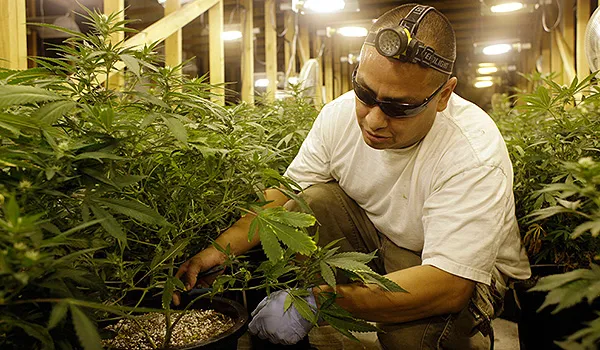Big Labor Is Going to Pot

In a stunning reversal, Big Labor puts individual choice before the “collective good” when it comes to organizing marijuana growers. Jillian Kay Melchior has the story in National Review Online today.
Dropping membership is the waking nightmare of American unionism. To cope, Big Labor is turning to pot.
Cannabis holds out promise as a growth industry, especially as state legislatures consider reform. Almost half of all states in the U.S. have revised their laws to allow or decriminalize marijuana in some form. In California alone, medical marijuana is a $1.3 billion industry, according to a 2011 study by See Change Strategy.
The size of the black market for marijuana is tough to calculate, but the 2011 study estimated it was around $18 billion in 2011,and legislative developments may soon bring much of it above ground.
For Big Labor, that looks like an opportunity to counteract its trend toward contraction. Against that background, unions have put their political heft behind state-level marijuana efforts, hoping to form a strong union presence within the industry. United Food and Commercial Workers has led the effort, going so far as to create a Medical Cannabis and Hemp Division. It seems to be paying off: Already, the UFCW counts around 3,000 cannabis-industry workers in its ranks.
The New Republic has been tracking unions’ pro-marijuana work.
. . . What’s unusual is that, on this particular issue, unions are courting businesses rather than confronting them. And the UFCW comes with an offer most in the marijuana business can’t refuse. Union endorsements lend legitimacy to an industry with a brand problem, and organized labor also knows how to mobilize and gain political support — skills the marijuana lobby has long lacked.
“It’s a collaboration,†says Jon Hughes, UFCW Local 5’s representative for organized marijuana dispensaries and collectives. “This isn’t your typical organizing campaign. . . . I always tell people, you will more likely see us on a picket line protesting what the federal government is doing [regarding marijuana] than, . . . let’s say, protesting working conditions†at a marijuana business.
Big Labor’s organizational skills are particularly valued because marijuana’s supporters are notoriously motley. Already, pot politics have created strange bedfellows. In Colorado, illegal-immigration hawk Tom Tancredo supported legalization alongside 70 percent of the state’s Latino voters; elsewhere, marijuana supporters range from Port Huron hippies to Ayn Rand libertarians.
“The big reason that we’re on the same page is that we have a common enemy,†says Dave Hodges, who operates the All-American Cannabis Club in San Jose. “The thing that’s trying to stop [cannabis-industry] jobs and the thing that’s trying to stop [marijuana businesses] are one and the same — the push of anti-marijuana propaganda. I don’t know whether there’s another situation too similar to this, but any time people in a fragile industry needed help organizing and speaking up for themselves, that’s what unions are for.â€
But the underlying political philosophy is actually quite dissonant. Businesses and labor unions rarely agree on economics. The key argument for legalizing drug use, then, is that individual choice outweighs the collective good, whether that choice is represented by government or by mediating institutions such as unions. Big Labor endorses that principle at its own peril.
Read the entire story on National Review Online.


